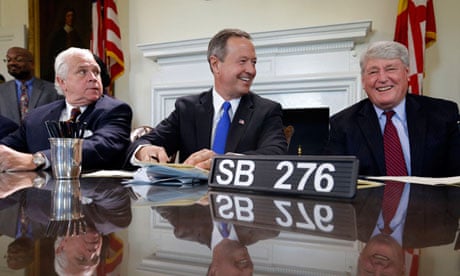Maryland has become the first southern US state to abolish the death penalty.
Democratic governor Martin O'Malley signed the measure Thursday. Attending was former Maryland death row inmate Kirk Bloodsworth. He is the first person in the country freed because of DNA evidence after being convicted in a death penalty case.
Maryland is the 18th state to abolish the death penalty and the sixth state in as many years to do so.
The bill will not apply to the five men the state has on death row, but the governor can commute their sentences to life without parole. O'Malley has said he will consider them on a case-by-case basis.
The state's last execution was in 2005.
Supporters of capital punishment said the governor was taking away an important tool to protect the public. Neil Parrott, chairman of a group called MDPetitions.com, scheduled a news conference on Friday to announce the group's decision on whether to launch a petition drive to try to put the death penalty ban on the ballot for voters to decide in 2014.
Last year, the Death Penalty Information Center said just four states carried out more than three-fourths of the executions in the United States last year, while another 23 had not put an inmate to death in 10 years.
Ben Jealous, president and CEO of the NAACP, noted the significance of a southern Democratic governor with presidential aspirations leading an effort to ban capital punishment.
Jealous noted that in 1992, then Arkansas governor Bill Clinton left the presidential campaign trail to oversee the execution of a man who had killed a police officer, a move widely viewed as an effort to shed the Democratic Party's image as soft on crime.
O'Malley considering seeking the 2016 presidential nomination.
"Our governor has also just redefined what it means to have a political future in this country," Jealous said.

Comments (…)
Sign in or create your Guardian account to join the discussion